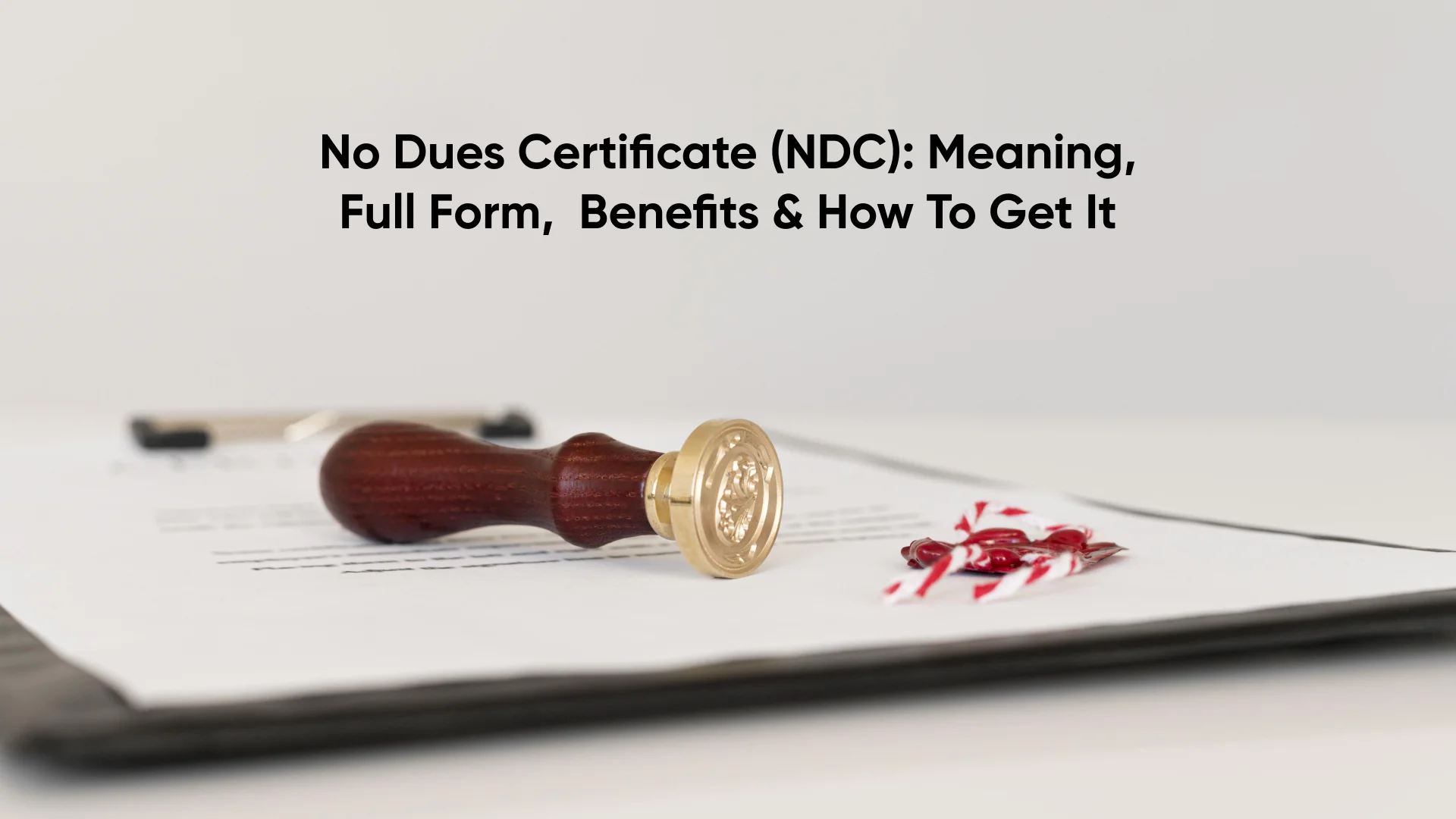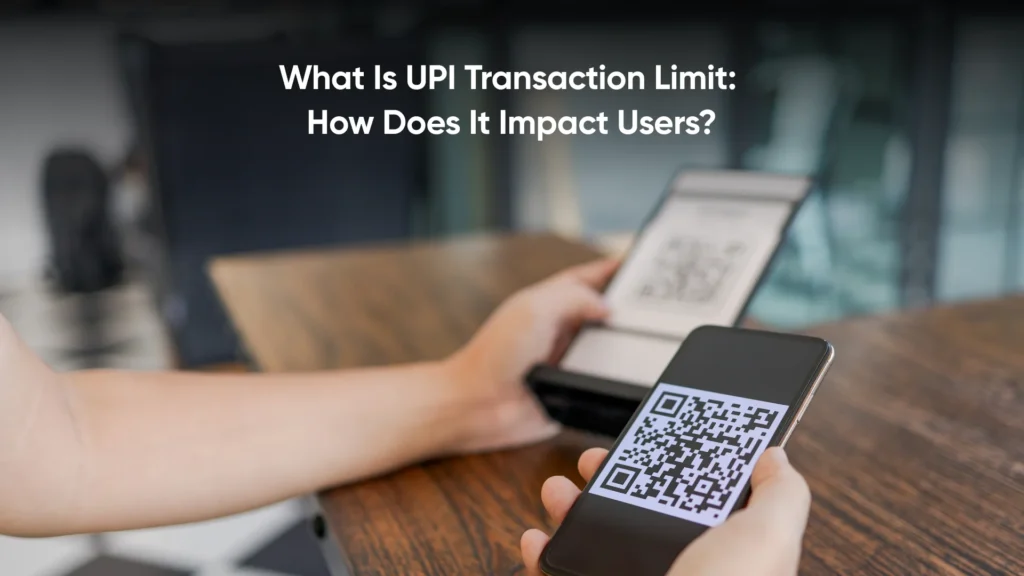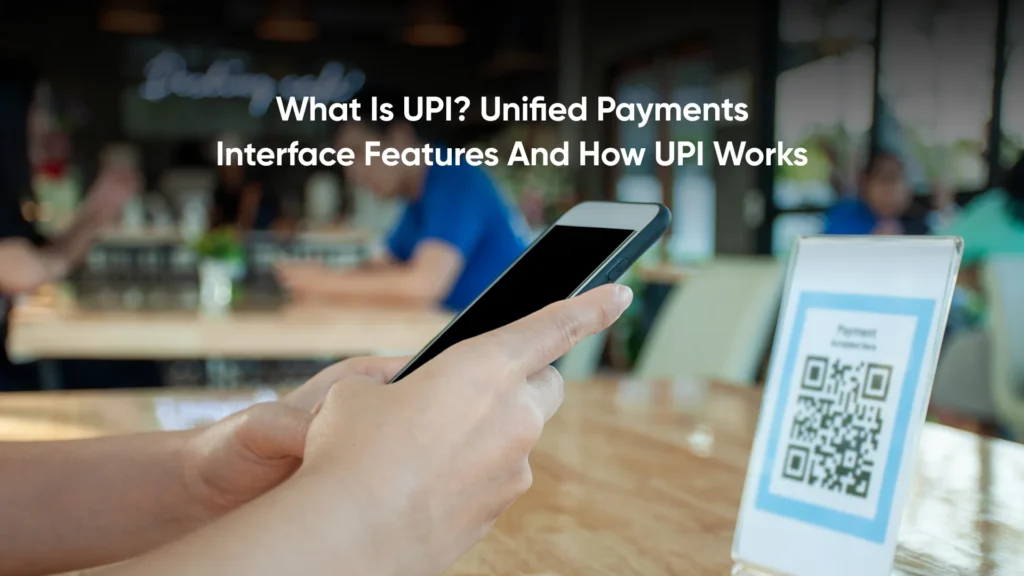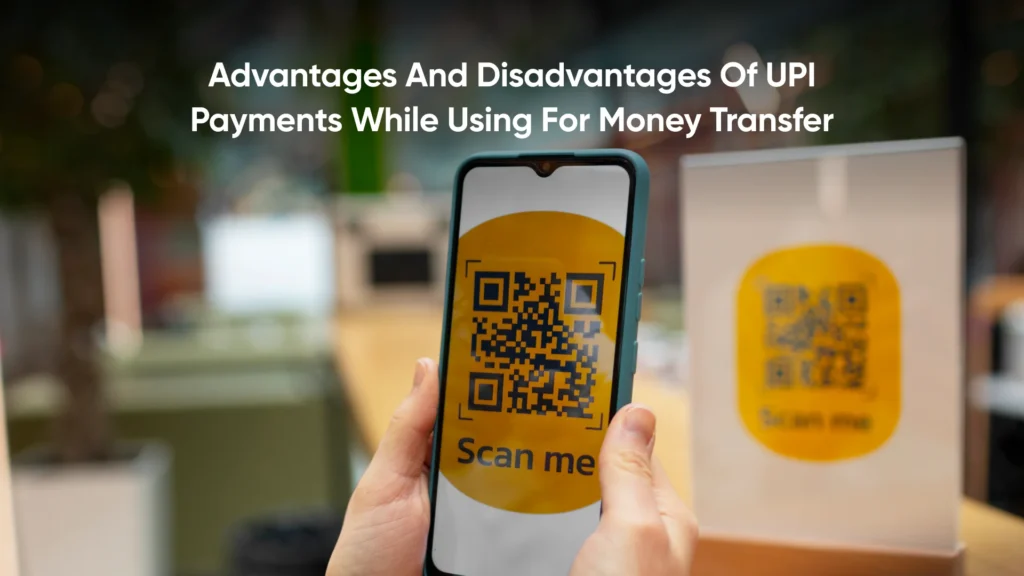No Dues Certificate (NDC): Meaning, Full Form, Benefits & How to get it
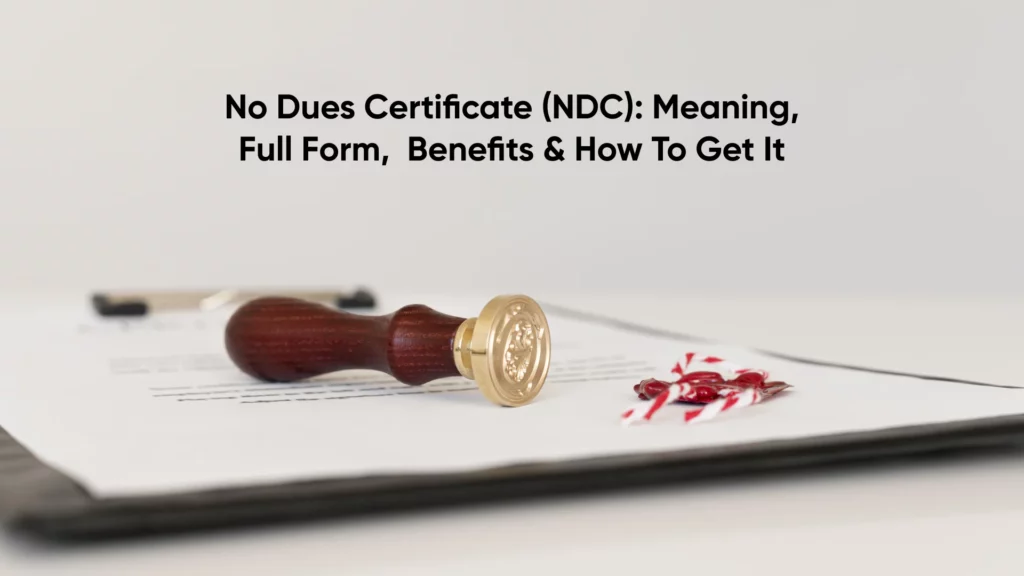
Table of Contents
ToggleUnderstanding No Dues Certificate
Getting a No Dues Certificate is like hitting the reset button on a bad credit history. It’s an all-clear signal that you have cleared your loan. A No Dues Certificate serves as an essential document ensuring that individuals and entities are free from any outstanding liabilities or obligations. This certificate acts as a testament to an individual fulfilling their financial obligation.
When it comes to personal finance, particularly when dealing with unsecured personal loans or seeking a personal loan up to 5 lakhs, a no dues certificate online can create a positive impact on your loan application. It not only facilitates trust between lenders but also streamlines the process of securing a quick personal loan online.
Importance of No Dues Certificate
Building Trust: This certificate is crucial to showcase clear financial records. It’s a testament to your financial responsibility, especially important for undertaking any personal loans.
Facilitating Loans: For those applying for an unsecured personal loan, having a No Dues Certificate can significantly expedite the process. It serves as evidence that you have no outstanding financial liabilities, making you a low-risk borrower among lenders.
Speeding Up Loan Approval: This certificate can speed up the process of obtaining a quick personal loan online. Lenders are reassured of the risk associated with providing credit which can potentially lead to faster loan approvals.
Ease of Access: With the advent of digital platforms, obtaining a no dues certificate online has become more straightforward. This convenience reflects India’s shift towards more digital financial transactions, making it easier for individuals to manage their financial records efficiently.
Digital Convenience: The ability to apply for and receive a no dues form online saves time and effort, aligning with the modern trend of digitization in financial services.
How to Obtain a No Dues Certificate
Banks or financial institutions issue a No Dues Certificate to confirm that a borrower has paid off all outstanding debts, indicating the end of their financial liabilities. This certificate is crucial for your credit profile and legal security.
Steps to Obtain a No Dues Certificate:
Application Submission: After completing your personal loan repayments, you should receive the NDC automatically. If not, you’ll need to contact your lender. Ensure your contact details are updated to avoid missed communications.
Check Delivery: The certificate is typically sent to your registered address. If you haven’t received it, contact your lender to check the status and request the NDC explicitly.
Certificate Format: The No Dues Certificate will include details such as your name, loan specifics, and confirmation that all dues have been cleared.
Format of No Dues Certificate Application
The format of a No Dues Certificate application is designed to be straightforward and accessible, ensuring that individuals can easily request this important document, whether for loan applications, or other financial clearances. Here’s a simplified breakdown of the typical format:
Header: Start with the title “Application for No Dues Certificate” at the top of the document to clearly state the purpose.
Applicant Details: Include your full name, address, contact information, and any identification number, if applicable.
Purpose of the Certificate: Briefly mention why you are requesting the no dues certificate. This could be for a loan application, or closing out a financial account.
Specific Details: If the certificate is needed for loan purposes then specify the type of loan and the lender’s name.
Declaration: A statement declaring that you have cleared all dues and there are no pending liabilities against your name. This is crucial for both no dues certificate online applications and physical submissions.
Date and Signature: Conclude the application with the current date and your signature, affirming the accuracy of the information provided.
Supporting Documents: Mention any documents you are attaching with the application, such as account statements, to substantiate your claim of having no dues.
Benefits of a No Dues Certificate Application
The benefits of obtaining a No Dues Certificate (NDC) in India are significant and provide both financial and professional advantages:
Ease in Securing Loans: Owning a No Dues Certificate demonstrates financial responsibility, making it easier to qualify for unsecured personal loans. Lenders trust that you have no outstanding financial obligations, enhancing your eligibility for quick online loans.
Quick Resolution of Financial Transactions: Using a No Dues Certificate can expedite the closure of various accounts or services, such as bank accounts or utility bill settlements. It ensures that all financial dealings are concluded to the satisfaction of all parties involved.
Access to Digital Convenience: The process to apply for a No Dues Certificate online adds remarkable convenience. It eliminates the need for in-person bank visits, saving you time and streamlining the process.
Documents Required for No Dues Certificate
Whether it’s for financial clearances, or securing a loan, certain documents are generally required to validate your claim of having no outstanding dues.
Here’s a list of the documents commonly needed:
Identity Proof: A government-issued ID card (Aadhaar, PAN, Passport, etc.) to verify the applicant’s identity.
Address Proof: Documents like utility bills or a passport to confirm the applicant’s current residence.
Application Form: A completed no dues form, available through the issuing authority’s website or office.
Financial Statements: Bank statements or account closure letters that show a zero balance or the settlement of all outstanding amounts.
Loan Closure Proof: For those who have recently paid off an unsecured personal loan, a closure letter from the lender confirms the full repayment of the loan.
Receipts of Payments: Evidence of payment of any outstanding dues, which could be utility bills, credit card bills, or any other liabilities.
Also Read: 6 Quick Tips If You Have Gone Overboard With Your Credit Card Bills
Process of Issuing a No Dues Certificate
The process of issuing a No Dues Certificate in India is methodical and designed to ensure that all financial obligations are thoroughly checked before the certificate is granted. Here’s a step-by-step overview of how the certificate is typically issued, incorporating both traditional and online methods:
Submission of Application: The first step involves submitting a duly filled no dues form along
with the required documents. This can be done either online, for a no dues certificate online, or at the respective office for physical submissions.
Verification of Documents: The issuing authority then verifies the submitted documents, including identity proof, address proof, clearance letters, and financial statements, to ensure that all dues have been cleared.
Issuance of Certificate: Once all verifications are complete and no dues are found, the no dues certificate is issued. This certificate can be in the form of a no dues letter or a digital certificate, depending on the mode of application.
Delivery: The final step involves the delivery of the certificate to the applicant. For those who applied online, the no dues certificate online can often be downloaded directly or sent via email. Physical certificates are either handed over in person or mailed to the applicant’s address.
Uses and Significance of No Dues Certificate
The No Dues Certificate holds significant value in various aspects of professional and financial life in India, serving multiple purposes that underscore its importance:
Financial Transactions: When closing bank accounts or settling utility bills, this certificate acts as proof that all outstanding payments have been made, preventing future disputes.
Loan Applications: For individuals applying for an unsecured personal loan or a quick personal loan online, having a no dues certificate can speed up the loan approval process. It reassures lenders of the applicant’s financial discipline, making it easier to secure loans.
Property Transactions: In the sale or purchase of property, this certificate is often required to ensure that there are no pending dues on the property, such as maintenance or utility bills.
Legal and Compliance: It serves as a legal document that can be used in disputes or legal proceedings to prove that there are no outstanding financial liabilities.
No Dues Certificate for Various Purposes
The No Dues Certificate is used in many situations to ensure smooth transitions and clear financial agreements in various areas.:
Loan Applications: Individuals applying for unsecured personal loans or a quick personal loan online can significantly benefit from this certificate. It acts as proof of financial responsibility, potentially speeding up the loan approval process.
Banking Procedures: Required when closing bank accounts to ensure that all debts to the institution have been settled, thereby avoiding future financial disputes.
Residential and Utility Clearances: Before moving out of a rented property or selling a property, a no dues certificate can be required to confirm that all utility bills and rent have been fully paid.
Comparison: No Dues Certificate vs. Clearance Letter
| Point of Difference | No Dues Certificate | Clearance Letter |
| Purpose: | Specifically certifies that all financial obligations have been cleared. | Provides a broader confirmation that includes financial, legal, disciplinary, or compliance clearances. |
| Use in Financial Transactions: | Crucial for closing bank accounts, property transactions, and applying for loans like an unsecured personal loan or a quick personal loan online. | While it can serve a similar purpose, it’s more versatile, covering legal and compliance aspects that might affect financial dealings. |
| Application Process: | Involves submitting a no dues form or applying for a no dues certificate online, along with financial documents as proof. | May require a more comprehensive set of documents, including legal and disciplinary clearance, in addition to financial documents. |
| Significance: | Acts as proof of financial integrity and responsibility, facilitating smooth financial and professional transitions. | Demonstrates a broader spectrum of responsibility and compliance, essential for a wide range of professional and legal scenarios. |
Conclusion
No dues certificate is testament to an individual’s financial capacity and integrity. Particularly when it comes to personal finance, such as securing an unsecured personal loan or aiming for a quick personal loan online, this document plays an important role. It reassures lenders of an applicant’s clean financial slate, thereby smoothing the path toward loan approval.
In a country where digital transactions are on the rise, the ability to obtain a no dues certificate online further simplifies the process, aligning with the convenience modern consumers seek. As individuals strive for financial freedom and seek to leverage opportunities for growth, the No Dues Certificate is proof of trust and reliability, essential for anyone looking to secure a personal loan.
Frequently Asked Questions
You may need a No Dues Certificate when applying for a personal loan, closing a bank account, or completing transactions involving property to prove there are no outstanding financial obligations.
Apply by filling out a no dues form and submitting it to the relevant authority or institution, along with any required documents such as identity proof and financial statements.
The time frame can vary widely but typically ranges from a few days to a couple of weeks, depending on the institution and the verification process involved.
Many institutions now offer the option to apply for a no dues certificate online, though this can vary. Check the specific institution’s website for online services.
Some institutions may charge a nominal fee for processing the no dues certificate, but this varies by institution and the type of certificate.
Failing to obtain a certificate when required can lead to complications in financial transactions, loan applications, etc. potentially delaying or hindering the process.
Verification can usually be done through the issuing institution. Some offer online verification services, where you can check the certificate’s authenticity using its unique identification number.
Contact the issuing authority immediately to report the discrepancy or error. Provide any necessary documentation to correct the information on the certificate.
